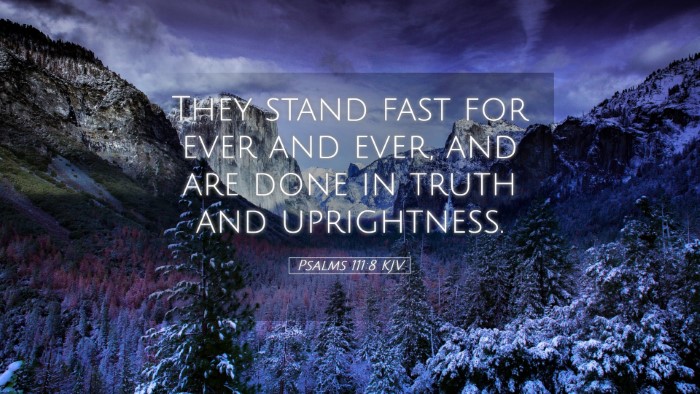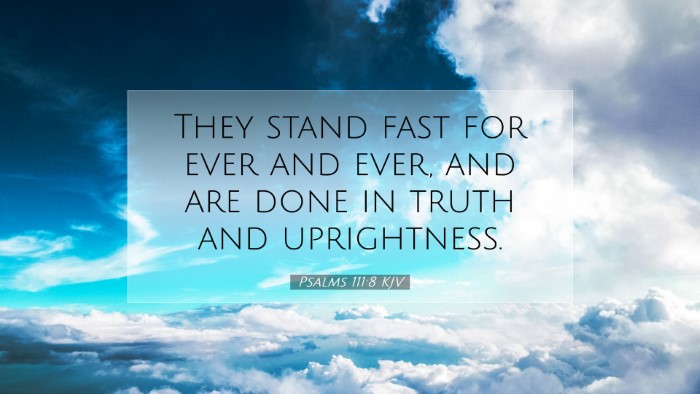Commentary on Psalms 111:8
Psalms 111:8 states: "They stand fast for ever and ever, and are done in truth and uprightness." This verse reflects on the enduring nature of God's works and the profound truthfulness embedded within them. In this commentary, we will delve into the insights provided by several classic public domain commentators.
Insights from Matthew Henry
Matthew Henry emphasizes the theme of God's works being both eternal and righteous. He remarks that the acts of God are not transient events but are established on a foundation of truth and integrity.
- Eternal Nature: Henry notes that God's commandments and judgments are unchangeable, providing steadfast guidance for believers. They are meant to withstand the test of time.
- Truth and Uprightness: He highlights that everything God does is rooted in truth and moral integrity. This aspect assures believers of the moral character of God's actions and plans.
- Encouragement for Believers: The assurance of God's eternal and righteous works serves to encourage believers to trust in His promises and to align their lives with His revealed order.
Insights from Albert Barnes
Albert Barnes approaches the verse by examining the larger context of God's works as mentioned in the previous verses of the Psalm. He points out the significance of understanding God's actions in the history of His people.
- Foundation of Divine Assurance: Barnes describes the works of God as a firm foundation that believers can rely upon. His deeds are accomplished in a spirit of truthfulness which gives confidence to His followers.
- Historical Perspective: He links the idea of permanence to the historical interventions of God in the lives of His people, describing how God's faithfulness has been displayed throughout biblical narratives.
- Application: Barnes encourages believers to see their circumstances through the lens of God’s eternal truth and righteousness, leading them towards hope and reliability in their faith.
Insights from Adam Clarke
Adam Clarke takes a deeper theological approach in his commentary, analyzing the implications of the verse in relation to God’s nature as the supreme moral authority.
- Divine Moral Character: Clarke emphasizes that true righteousness must be the foundation of any work associated with God, reinforcing His nature as being perfectly upright and just.
- Endurance of God's Sovereignty: He points out that God’s laws remain unshaken in their authority and relevancy, irrespective of human alterations or societal changes.
- Call to Action: Clarke urges believers to strive for uprightness in their own lives, reflecting the character of God in their actions by holding fast to His truth.
Theological Implications
The insights from these commentators converge on several key themes which have significant theological implications:
- Trust in Divine Reliability: Believers are called to trust in the unwavering nature of God’s character, as depicted through His eternal works and righteousness.
- Moral Imperative: The call for righteousness becomes a personal and communal imperative for believers, urging them to emulate the uprightness of God's actions.
- Historical Reflection of Faith: The historical aspect reminds faith communities of God's faithfulness in the past, encouraging them to expect His continued action in their present and future.
Contemporary Application
The teachings derived from Psalms 111:8 are deeply applicable to contemporary life, providing guidance and encouragement in several areas:
- Strengthening Faith: In times of uncertainty, believers can draw strength from the realization that God's works are lasting and grounded in truth.
- Promoting Integrity: The call for uprightness challenges individuals and communities to foster environments of honesty and ethical behavior.
- Community Trust: As a church body remembers God’s historical interventions, a culture of trust and reliance on God’s character can flourish.
Conclusion
Psalms 111:8 serves as a profound reminder of the nature of God’s works — eternal, true, and morally upright. Insights from esteemed commentators like Matthew Henry, Albert Barnes, and Adam Clarke help believers of all backgrounds to understand the significance of these divine attributes in their lives. By embracing these truths, individuals can not only deepen their faith but also reflect God’s character within their communities.


